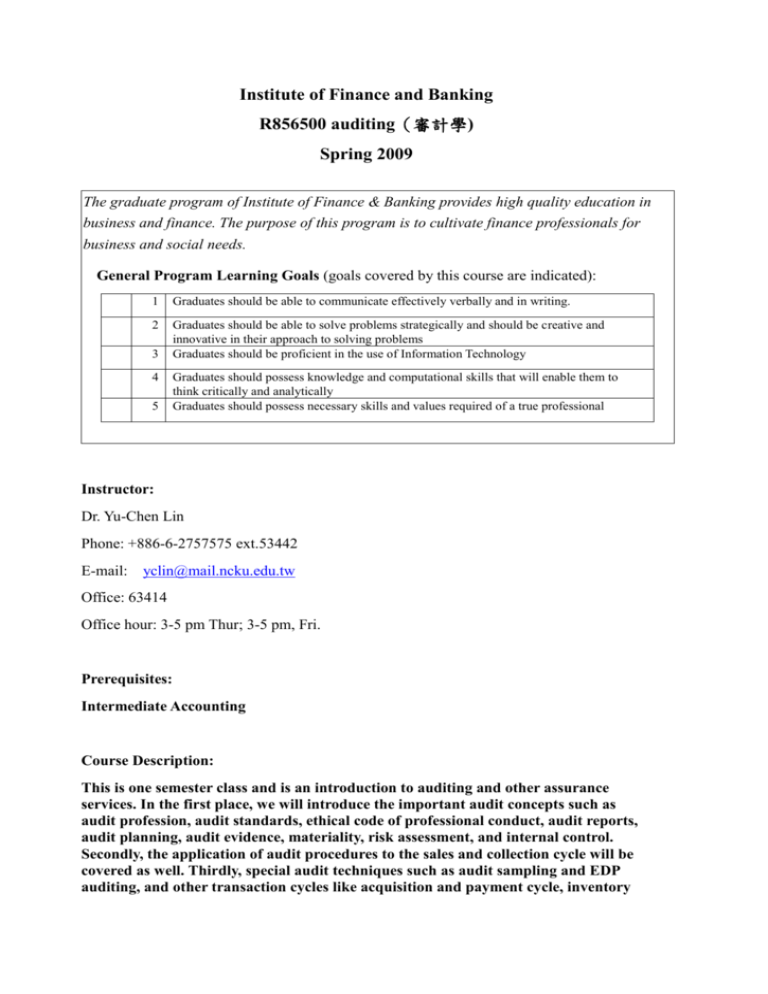
Institute of Finance and Banking
R856500 auditing(審計學)
Spring 2009
The graduate program of Institute of Finance & Banking provides high quality education in
business and finance. The purpose of this program is to cultivate finance professionals for
business and social needs.
General Program Learning Goals (goals covered by this course are indicated):
1
Graduates should be able to communicate effectively verbally and in writing.
2
Graduates should be able to solve problems strategically and should be creative and
innovative in their approach to solving problems
Graduates should be proficient in the use of Information Technology
3
4
5
Graduates should possess knowledge and computational skills that will enable them to
think critically and analytically
Graduates should possess necessary skills and values required of a true professional
Instructor:
Dr. Yu-Chen Lin
Phone: +886-6-2757575 ext.53442
E-mail:
yclin@mail.ncku.edu.tw
Office: 63414
Office hour: 3-5 pm Thur; 3-5 pm, Fri.
Prerequisites:
Intermediate Accounting
Course Description:
This is one semester class and is an introduction to auditing and other assurance
services. In the first place, we will introduce the important audit concepts such as
audit profession, audit standards, ethical code of professional conduct, audit reports,
audit planning, audit evidence, materiality, risk assessment, and internal control.
Secondly, the application of audit procedures to the sales and collection cycle will be
covered as well. Thirdly, special audit techniques such as audit sampling and EDP
auditing, and other transaction cycles like acquisition and payment cycle, inventory
and warehousing, capital acquisition and repayment cycle, etc. In the end, this course
will discuss every types of audit report, auditor legal liability, and other assurance and
nonassurance services.
Course Objectives:
The objective of the auditing course is to introduce the nature of audit and demand
for audit and other types of assurance services offered by CPAs in the changing
business environments. This course is also devoted to understand the underlying
concepts and the procedures utilized in performing audits. This course will help each
student obtain the skill, knowledge, and personal characteristics necessary to practice
successfully as an auditor.
Content Summary:
Class Schedule
WEEK
NO.
1
CONTENTS
CORRESPONDING
CHAPTER IN TEXT
Introduction
Introduction
2
The demand for audit and other assurance services
The CPA profession
Overview of reporting
Chapter 1
Chapter 2
Chapter 3
3
Professional ethics
Legal liability
Chapter 4
Chapter 5
4
Audit responsibilities and objectives
Audit evidence
Chapter 6
Chapter 7
5
Audit planning and analytical procedures
Materiality and risk
Chapter 8
Chapter 9
6
Materiality and risk (cont.)
Chapter 9
7
No Class
8
Midterm examination#1
Midterm #1
Sec. 404 audits of internal control and control risk
Chapter 10
Fraud auditing
Chapter 11
9
WEEK
NO.
10
11
CONTENTS
CORRESPONDING
CHAPTER IN TEXT
The impact of information technology on the audit
process
Overall audit plan and audit program
Chapter 12
Chapter 13
Audit of the sales and collection cycle: tests of
controls and substantive tests of transactions
Accounts receivable: tests of details of balances
Chapter 14
Chapter 16
Audit sampling for tests of controls and
12
substantive tests of transactions
Audit sampling for tests of details of balances
Chapter 15
Chapter 17
Chapter 17
13
Audit sampling for tests of details of
balances (cont.)
14
Midterm examination #2
Midterm #2
15
Audit of the acquisition and payment cycle
Chapter 19
Chapter 20
16
Audit of cash balances
Completing the audit
Chapter 23
Chapter 24
17
Audit reporting-completion and other assurance
services reports
Chapter 3
Chapter 25
18
Internal and governmental financial auditing and
operational auditing
Chapter 26
19
Final Exam
Final Exam
The schedule is subjective to change, which will be announced by the instructor.
Textbook:
Elder, Beasley, and Arens, 2008, Auditing and Assurance Services: An Integrated Approach,
12th ed. Pearson Prentice Hall. (華泰: 02-2162-1217)
Recommended references:
Statement of Auditing Standards, Accounting Research and Development Foundation
(R.O.C.) http://www.ardf.org.tw/html/center3.htm#審計準則公報
Code of Professional Ethics, National Federation of Public Accountants Association
(R.O.C.) http://www.roccpa.org.tw/Download.php
Rittenberg and Schwieger, 2005, Auditing: Concepts for a Changing Environment,
Thomson Southwestern. (滄海:04-2708-8787)
審計新論,李宗黎、林蕙真著,第四版,正業會審專業叢書
Course Requirement:
Since we have to finish 26 chapters within this class, the time schedule is tight. Therefore, we may
not cover everything that is important. All students must have read the text materials before class,
and try to take the initiative to raise questions on materials that you do not understand. In addition,
I will give you the quizzes and case discussions in class. You may not pass these if you have not
previewed.
Grading policy:
Participation and Quizzes
Case Study and Group Project
Exams
10%
30%
60%








